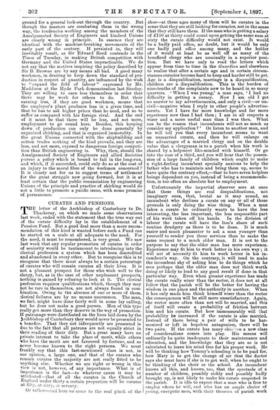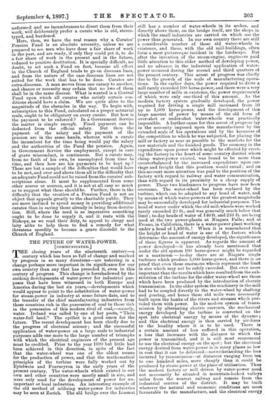CURATES AND PENSIONS.
THE letter of the Archbishop of Canterbury to Dr. Thackeray, on which we made some observations last week, ended with the statement that the true way out of the curate difficulty lay in the establishment of a Pension Fund. But a good deal more than a mere recom- mendation of this kind is wanted before such a Fund can be started on a scale at all adequate to the need. For tbe need, it must be remembered, is very great. We saw last week that any regular promotion of curates in order of seniority would be tantamount to introducing into the clerical profession a system which has been discredited and abandoned in every other. But to recognise this is to recognise that there must always be a certain percentage of curates who will remain curates all their lives. It is not a pleasant prospect for those who wish well to the clergy, but, as in the case of other unpleasant prospects, nothing is gained by refusing to look at it. The clerical profession requires qualifications which, though they may not be rare in themselves, are not always found in com- bination. Owing to the absence of one or more of them, alerical failures are by no means uncommon. The man, we feel, might have done fairly well in some lay calling, but he does not make a good parson. Men of this type really get more than they deserve in the way of promotion. If patronage were distributed on the lines laid down by the Irchbishop of Canterbury they would never be presented to benefice. That they not infrequently are presented is due to the fakt that all patrons are not equally strict in their reading of their duty. But a great many have no private interest to take the place of merit, while others who have the merit are not favoured by fortune, and so never become known to the right persons. We must frankly say that this last-mentioned class is not, in our opinion, a large one, and that of the curates who remain curates the majority are not really fitted to be anything else. Whether we are right or wrong in this :new is not, however, of any importance. What is of Importance is the fact--to whatever cause it may be attributed—that of all the curates in the Church of England under thirty a certain proportion will be curates at fifty, at sixty, at seventy. Or rather—and here we come to the real pinch of the shoe—at these ages many of them will be curates in the sense that they are still looking for curacies, not in the sense that they still have them. If the man who is getting a salary of £150 at thirty could count upon getting the same sum at sixty the curate difficulty would not exist. It would be a badly paid office, no doubt, but it would be only one badly paid office among many, and the holder of it would at least be as well off as many of the beneficed clergy who are nominally in a superior posi- tion. But we have only to read the letters which appear from time to time in the Guardian and elsewhere to realise that after a certain age and in certain circum- stances curacies become hard. to keep and harder still to get. Age is a disqualification, marriage is a. disqualification, children are a disqualification. This is the burden of nine-tenths of the complaints now to be heard in so many quarters. When I was young,' a man says, ' I had no difficulty in getting a curacy. Now I am old I get no answer to my advertisements, and only a civil—or un- civil—negative when I reply to other people's advertise- ments. Yet I have far more knowledge and far more experience now than I had then ; I am in all respects a wiser and a more useful man than I was then. What can be the reason that incumbents will not so much as consider my application ? ' Or listen to another man, and he will tell you that every incumbent seems to want an unmarried curate, and then he will enlarge on the advantages of a married clergy and on the double value that a clergyman is to a parish when his work is shared by a helpmeet like-minded with himself. Or go into the case of a third, and you will hear that the posses- sion of a large family of children which ought to make a right-feeling incumbent specially anxious to help the father who has to maintain and bring them up, seems to have quite the contrary effect,—that to have seven helpless beings dependent on you, instead of being a recommenda- tion, is too often an absolute bar to employment.
Unfortunately the impartial observer sees at once that these things are real disqualifications, not imaginary ones, that, brutal as it may sound, an incumbent who declines a curate on any or all of these grounds is only doing the wise thing. When a man takes a curate he ordinarily wants to have the less interesting, the less important, the less responsible part of his work taken off his hands. In the division of labour the curate will have the lion's share of such routine drudgery as there is to be done. It is much easier and much pleasanter to ask a man younger than yourself to render you these services than to make the same request to a much older man. It is not to the purpose to say that the older man has more experience. Experience may fit him to work better in his own way ; it will not of necessity fit him to work better in his in- cumbent's way. On the contrary, it will tend to make the incumbent shy of asking hint to do things which he sees perhaps that the older man does not think worth doing or likely to lead to any good result if done in that particular way. Even when greater experience has made the curate really wiser than the rector, it does not at all follow that the parish will be the better for having the wisdom in one place and the authority in another. When it han only made him think himself wiser than the rector the consequences will be still more unsatisfactory. Again, the rector more often than not will be married, and this of itself will create a probability of friction between him and his curate. But how immeasurably will that probability be increased if the curate is also married. Instead of there being a pair of wills to be har- monised or left in hopeless antagonism, there will be two pairs. If the curate has many chin' ren a new class of considerations comes into play. His means will ordinarily be quite inadequate to their maintenance and education, and the knowledge that they are so is not calculated to leave his mind free for his proper work. He will be thinking how Tommy's schooling is to be paid for, how Mary is to get the change of air that the doctor says she must have if she is to get well, when he ought to be thinking of the choir or the school. An incumbent knows all this, and knows, too, that the spectacle of a number of children, possibly sickly and possibly badly brought up, is not likely to make his curate respected in the parish. It is idle to expect that a man who is free to employ whom he will, and who has an ample choice of young, energetic men, with their theories of parish work unformed and no incumbrances to divert them from their work, will deliberately prefer a curate who is old, stereo- typed, and burdened. Here, then, we have the real reason why a Curates' Pension Fund is an absolute necessity, unless we are prepared to see men who have done a fair share of work in the past, and are ready, if only they could get it, to do a fair share of work in the present and in the future, reduced to positive destitution. It is specially difficult, no doubt, to set such a Fund on foot, because all effort in the Church of England tends to go on diocesan lines, and from the nature of the case diocesan lines are not suited for the work that has to be done. Curates are extra-diocesan. A man moves from one curacy to another, and chance or necessity may ordain that no two of them shall be in the same diocese. What is wanted is a Central Fund upon which all curates who satisfy certain con- ditions should have a claim. We are quite alive to the magnitude of the obstacles in the way. To begin with, subscription to this Fund, calculated on a proper actuarial scale, ought to be obligatory on every curate. But how is the payment to be enforced ? In a Government Service the matter is simple enough. Fixed payment can be deducted from the official salary. But then the payment of the salary and the payment of the pension are in the same hands, whereas with a curate the incumbent for the time being would pay the salary and the authorities of the Fund the pension. Again, in Government Service the employment, .except in case of grave misconduct, is continuous. But a curate may, from no fault of his own, be unemployed from time to time, and then how are his payments to be kept up ? These are but a sample of the difficulties that would have to be met, and over and above them all is the difficulty that an adequate Fund could not be raised from the curates' sub- scriptions alone. It must be supplemented from some other source or sources, and it is not at all easy so much as to suggest what these should be. Further, there is the difficulty that the creation of a Pension Fund is not an object that appeals greatly to the charitable public. They are more inclined to spend money in providing additional curates than in saving those already in being from destitu- tion. Still, where the need is so imperative something ought to be done to supply it, and it rests with the Bishops, as we read their duty, to appeal to clergy and laity alike to help them to find a remedy for what threatens speedily to become a grave discredit to the Church of England.



































 Previous page
Previous page